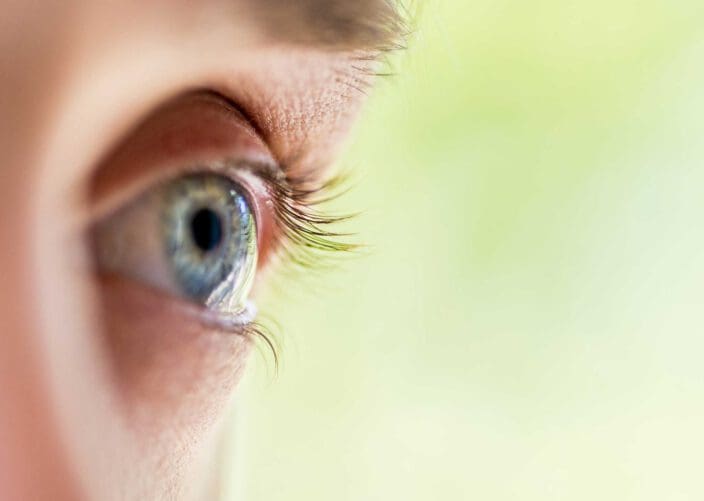
Medically Reviewed by Michelle A. Sato, M.D. NVISION Surgeon
Guide to Cataract Blindness and Cataract Vision Loss
Last Updated:

Medically Reviewed by Michelle A. Sato, M.D. NVISION Surgeon
Table of Contents
There are several causes of blindness worldwide. Cataracts are one of the most treatable types of conditions which, without surgical intervention, cause blindness.
Cataract surgery removes the diseased lens from the eye and replaces it with an artificial lens, but most ophthalmologists will not move their patients immediately into cataract surgery when the condition is first diagnosed. Many people experience slowly worsening symptoms with cataracts, but can adjust light levels in their homes, along with prescription lenses like glasses, to manage the problem for years. However, once partial blindness impacts your ability to perform daily activities and puts your personal safety at risk, you will likely need cataract surgery.
We’ll help you learn more about what blindness is in the medical community, how cataracts lead to blindness, and what kind of timeline you can expect if you have cataracts or are at risk of developing them.
Can Cataracts Cause Blindness?
Can Cataracts Cause Blindness?
Yes, cataracts can lead to significant vision impairment and, if left untreated, can cause blindness. Cataracts develop when the lens of the eye becomes clouded. As they progress, they can obscure vision, making tasks like reading or driving difficult. Severe cataracts can greatly reduce vision to the point of blindness. Regular check-ups with an optometrist or ophthalmologist are crucial for early detection and treatment.
How Long Does It Take to Go Blind from Cataracts?
Cataracts most often set in due to age, and they are likely to begin about age 40. They progress slowly, and many people do not need cataract surgery until they are 60 or older. There are several risk factors that increase the likelihood of developing cataracts, so you should consider making some lifestyle changes if you have a family history of this condition, are concerned about the condition, or have already developed early stage cataracts.
- Get regular eye exams to follow changes in your vision and diagnose any diseases.
- Quit smoking.
- Drink alcohol moderately or not at all.
- Wear sunglasses to protect against ultraviolet (UV) exposure.
- Eat a healthy diet.
- Manage other health problems like diabetes or heart disease.
Even with these lifestyle changes, your cataracts will progress over time. Eventually, you will need cataract surgery to prevent full blindness.

What Causes Blindness?
Blindness colloquially means total vision loss, but the medical definition for the term is slightly different. For example, partial blindness refers to a loss of vision leading to extremely limited visual input; you may not see anything clearly, even with glasses or contact lenses, but you may be able to see colors or shapes. Complete blindness means that you do not see anything including light. Legally blind people have vision rated at 20/200 or worse, so they cannot see the “E” on the top of a standard eye chart.
While both partial and complete blindness can be congenital, meaning you may be born with this condition or it could begin in early childhood, this is also a condition that impacts many people in adulthood when they experience vision loss. There are several reasons you may lose your vision, including:
You deserve clear vision. We can help.
With 135+ locations and over 2.5 million procedures performed, our board-certified eye surgeons deliver results you can trust.
Your journey to better vision starts here.
- An accident or injury leading to eye trauma or loss.
- Diseases like diabetes that can lead to nerve degeneration, including in the eye.
- Macular degeneration.
- Blocked blood vessels from a blood clot.
- Lazy eye.
- Complications from an eye surgery.
- Eye-specific diseases like cataracts.
Although there are many causes of blindness that are not treatable, cataracts are one of the most common and most treatable issues that can lead to partial or complete blindness.
When Should I Expect to Need Cataract Surgery to Prevent Blindness?
According to the Centers for Disease Control and Prevention (CDC), there are 20.5 million Americans ages 40 and older who have a cataract in one or both eyes. These cataracts are predominantly age-related. Millions more struggle with cataracts from trauma, disease, congenital issues, family history, or other problems that cause cataracts to form sooner.
By age 75, about half of all Americans have cataracts or a history of cataracts. About 6.1 million people, or 5.1 percent, have cataract surgery, in which the diseased lens is removed and replaced with an artificial lens. This is the simplest way to prevent blindness in people who have cataracts, but even after diagnosis of a cataract, you are not likely to be sent to surgery immediately.
It is difficult to predict how rapidly cataracts will develop, as this experience is different for everyone. Age-related cataracts often progress slowly, but this is not a fast rule. Your ophthalmologist will be able to make an educated guess about the progression of this disease based on your eye exams, what type of cataracts you have, and how the cataracts developed.

Additionally, cataracts typically develop in both eyes, but they will begin at different times and progress at different rates. Again, keeping up with regular eye exams and making lifestyle changes can slow the progression of cataracts so you can retain your vision as long as possible.
However, there is no medically proven way to prevent cataracts, and they will progress over time after you develop them. Fortunately, cataract surgery is very effective at restoring most of your vision once your cataracts have progressed to the point of partial blindness.
After a few weeks of recovery, you will be able to see most things clearly, so you can go back to driving, reading, and performing other tasks without a lot of corrective eye wear. You will likely still need a prescription of glasses or contact lens to improve the focus of your artificial lens.
You deserve clear vision. We can help.
With 135+ locations and over 2.5 million procedures performed, our board-certified eye surgeons deliver results you can trust.
Your journey to better vision starts here.
What to Do if Cataracts Cause You to Go Blind
If you become partially or fully blind, cataract surgery to remove your diseased lens can restore your sight. Before you have corrective surgery, you can use several resources to help you cope with your blindness:
- Accessibility Apps have mobile apps to help you tackle your daily challenges while making the world more accessible.
- Freedom Scientific develops high-quality video magnifiers, screen magnification software, and braille displays.
- MaxiAids is a leading supplier of independent living products.
Agencies that can help include:
- American Council for the Blind, a consumer organization that helps its visually impaired members maintain security and independence.
- Hellen Keller International is dedicated to saving the lives and sight of the most vulnerable.
- Veteran Active Duty Resources that serves veterans, active duty service members, and their family members.
Preventing Blindness from Cataracts
There’s no such thing as cataract prevention. Eye research has not made any substantive cause-and-effect links for cataracts. However, there are ways you can slow their progression toward blindness:
- Wear hats when out in the sun to protect you from UV rays.
- Avoid fluorescent lights since these increase glare that makes it hard to see.
- Consider nutritional supplements like daily multivitamins as directed by a doctor.
- Limit night drives to minimize glares.
The best way to avert blindness after being diagnosed with cataracts is to maintain regular eye checks to track the progress of your condition.
You deserve clear vision. We can help.
With 135+ locations and over 2.5 million procedures performed, our board-certified eye surgeons deliver results you can trust.
Your journey to better vision starts here.
References
- Blindness and Vision Loss. (August 20, 2016). Medline Plus.
- What Are Cataracts? (November 9, 2018). American Association of Ophthalmology (AAO).
- About Cataracts. (September 2015). National Eye Institute (NEI).
- Cataracts. (June 23, 2018). Mayo Clinic.
- Cataracts: Common Eye Disorders. (September 29, 2015). Centers for Disease Control and Prevention (CDC).
- Eye Diseases. (2015). American Association of Ophthalmology (AAO).
- How Long Does It Take for Cataracts to Develop? (December 22, 2011). American Association of Ophthalmology (AAO).
- Lifestyle changes to manage cataracts. (November 9, 2010). Winchester Hospital.
- Eye Diseases & Conditions: Cateract. (July 2021). Prevent Blindness.
- Resources to Get You Started with Vision Loss. (July 2021). The Blind Guide.
- Blindness Due to Cataract: Epidemiology and Prevention. (1996). Annual Reviews Public Health.
- Prevalence and causes of blindness, visual impairment, and cataract surgery in Timor-Leste. (October 5, 2017). Clinical Ophthalmology.

Michelle Sato, M.D. is a board certified ophthalmologist specializing in glaucoma, cataracts and general ophthalmology.
This content is for informational purposes only. It may have been reviewed by a licensed physician, but is not intended to serve as a substitute for professional medical advice. Always consult your healthcare provider with any health concerns. For more, read our Privacy Policy and Editorial Policy.
